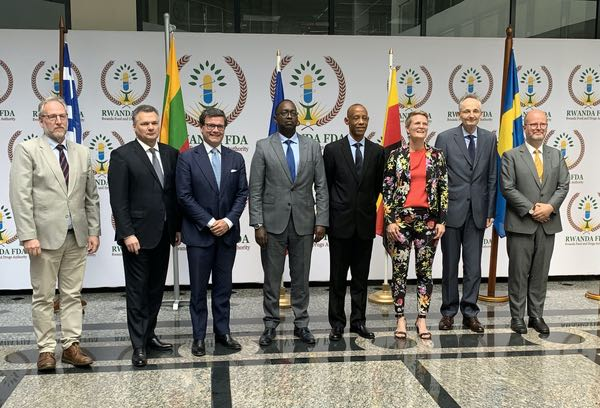
Ambassadors from seven european countries with the Rwanda Health Minister
The European Union launched today a EUR 2 million Twinning cooperation that will provide the Rwanda Food and Drug Authority (Rwanda FDA) with a peer-to-peer partnership including several EU Member State regulatory agencies. This Twinning agreement was signed between the Head of Delegation of the European Union to Rwanda, Ambassador Nicola Bellomo the Ambassador of France to Rwanda Antoine Anfre in the presence of the Minister of Health of Rwanda Dr Daniel Ngamije and Director General of the Rwanda FDA Dr Emile Bienvenu.
France is the lead Member State of the consortia, which is further composed of Germany, Belgium and Lithuania. It aims to support the Rwanda FDA to improve the enabling environment for regulation of medicinal products and vaccines in the country.
The EU also delivered critical quality control laboratory equipment to the Rwanda FDA, including key integrated information management system equipment, to allow the Authority to establish a more modern Quality Control Laboratory and thereby support its role to ensure the safety, efficacy and quality of vaccines and pharmaceutical products.
On this occasion, EU Ambassador, Nicola Bellomo stated; “It is with great pleasure that we welcome today’s signature. This is a real Team Europe initiative, bringing together specialized expertise from several EU Member States with RFDA experts.
It is timely, with the start of the construction of Rwanda’s BioNtech vaccine production plant. Lastly, this is a ground-breaking partnership. It is the first Twinning cooperation between Rwanda and EU Member State public authorities and the first Twinning in the field of health in Sub-Saharan Africa.”
The Ambassador of France to Rwanda, Antoine Anfre said; “This is a very ambitious and timely Team Europe Initiative. France together with Belgium, Germany and Lithuania is proud to be part of this Twinning Agreement, which will enable Rwanda to become a manufacturing hub for drugs and vaccines. The regulatory aspects are crucial in this field. I am confident the forthcoming close
partnership between Rwanda Food and Drugs Authority (Rwanda FDA) and French Agence Nationale de Sécurité du Médicament (ANSM), German Paul Ehrlich Institute, Belgian Sciensano and Lituanian State Medicines Control Agency is a game changer. Congratulations and thanks to the EU Delegation, the operator Expertise France and the Government of Rwanda for their respective achievements in this process”
The Minister of Health Dr Daniel Ngamije described the cooperation as crucial to support Rwanda’s medicine’s regulatory framework; “The Government of Rwanda appreciates the efforts deployed through European Commission by the consortium partner countries (France, Germany, Belgium, and Lithuania) to mobilize their best Health and Regulatory Institutions as well as expertise from other three EU Member States (Sweden, Greece and Austria) to support the Republic of Rwanda in strengthening its medicines’ regulatory framework. Rwanda looks forward to the implementation of this cooperation and is committed to use the laboratory equipment from the EU team to deliver efficient laboratory services especially in the regulation of vaccines”.
“This project comes at the right time when Rwanda is already on the road to vaccine manufacturing, which requires strengthening the regulatory capacity of Rwanda FDA. This project therefore aims at supporting the strengthening of Rwanda FDA’s regulatory framework. Through the EU financial support, Rwanda FDA has also received laboratory equipment. The equipment received under this consignment will increase the capacity of our quality control laboratory as we move into regulation of vaccines which is one of the Authority’s priorities as of today, “ said Rwanda FDA Director General, Dr. Emile Bienvenu.
The Twinning cooperation will provide the Rwanda FDA with access to support from EU National Regulatory Agencies, including expert missions, seminars, workshops, training courses and study visits, to achieve jointly established objectives. The programme includes the secondment to Rwanda FDA of a full-time staff member of an EU National Regulatory Agency for 2 years, to direct the programme, mobilise activities, and work directly with the management of the Rwanda FDA.
Furthermore, the equipment delivered today will also help the agency in achieving the required level of certification by the World Health Organization (WHO) for vaccine production regulatory oversight. It included deep freezers, refrigerators, workbenches, a refractometer (a tool that can determine the concentration of a particular substance in a liquid solution), desiccators (sealed containers that are used for drying samples), and data loggers (an electronic device that records data over time), among other items.
Lastly, just recently, the EU in Rwanda, together with ENABEL, also launched a EUR 7 million programme that will provide training and further laboratory equipment to the Rwanda FDA, as well as help digitalise the country’s pharmaceutical system. It will also work to improve the wider skills’ development in relevant fields for vaccine production, specifically at university level.
The three actions are part of the EU’s overall support package to vaccine production in Africa for Africa under its EU Global Gateway, the new European strategy to boost smart, clean and secure links in digital, energy and transport sectors and to strengthen health, education and research systems across the world. They are also a building block of the Team Europe initiative on manufacturing and access to vaccines, medicines and health technologies in Africa (MAV+) initiative.”
The EU’s Global Gateway initiative, a EUR 150 billion investment package, will, among others, support efforts in vaccine deployment, infrastructure and production capacities, skills development, regulatory frameworks and universal health coverage.
MAV+ initiative will help create an enabling environment for local vaccines manufacturing in Africa and tackle barriers on both supply and demand sides. It is backed by EUR 1 billion from the EU budget and the European development finance institutions such as the European Investment Bank (EIB). This amount will be further enhanced by contributions from EU Member States. (End).
